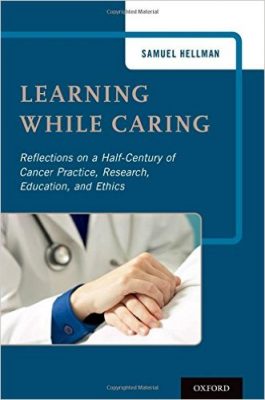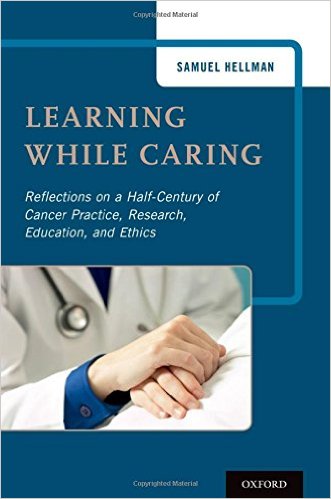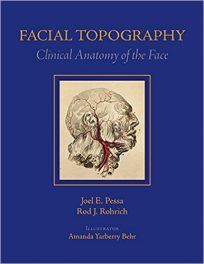 Author: Samuel Hellman, MD
Author: Samuel Hellman, MD
Publisher: Oxford University Press – 323 pages
Book Review by: Sonu Chandiram
This book is a collection of essays and articles of Dr. Samuel Hellmann, one of the world’s most distinguished contributors to, and teachers of knowledge about cancer. He delves into issues brought about by advances and changes in the field of medicine in the last 50 years.
With many years as a physician, researcher, and educator, he taps into the wisdom and insight he has gained, and writes about the controversies and challenges that arose during his professional career that he dealt with, and that still confront people today in academia and medicine in general, and oncology in particular.
Despite major changes in biological science and medical practice, he asserts that two imperative obligations of doctors still remain: to treat their patients as well as they can based on their insight, experience and skills, and to advance the frontiers of research so that we can treat them even better.
The contents of this excellent reflective work are organized simply into five chapters sandwiched between a layout of the important issues, and conclusions. They are based on Dr. Hellmann’s background dealing with them on a daily basis in his long academic life and medical practice. Here is an overview of what you will read about:
Introduction
- Medical Ethics and Learning
- Academic Medicine
- Research
- Perceptions of Cancer
- Heroes
Summing Up
One of the challenges that medical practitioners face in the course of their practice is brought out in the 1984 commencement address he delivered to the graduates of Allegheny College. It is aptly entitled A Doctor’s Dilemmas. In it he asks:
“My most recent personal involvement has been to develop guidelines to determine under what circumstances it is appropriate not to offer mechanical life-sustaining assistance to terminally-ill patients. Such seemingly medical decisions have significant ethical, social, and religious implications. One is best prepared to confront them by a broadly-based liberal education.”
Doctors who work in specialties such as oncology where they treat patients in different stages of cancer are repeatedly confronted with questions related to prolonging or ending a life.
Meanwhile those who work in specialties such as obstetrics-gynecology – on the other end of the spectrum of the living-dying continuum (birthing) – sometimes also encounter patients who want an abortion.
Whatever their beliefs, and whether or not they perform the abortion or refuse to do so, questions such as these haunt them : what is the definition of life, and when does it begin, e.g., when is the fetus viable?
On this, Dr. Hellman writes: “These questions can be answered in scientific, ethical, social, and religious terms and one cannot act on any of these terms exclusively. As our skills increase, the circumstances and age at which viable human life begins may be considered to become earlier and earlier.”
Research discoveries in medical science and technological advancements in patient care have brought up numerous ethical and philosophical challenges that few people are qualified enough to tackle.
But the highly-accomplished Dr. Hellman, with a lifetime of serving patients, students and knowledge-seekers, and a broad and deep background in medicine, research, and education, has reflected on, and competently addresses these challenges, coming up with solutions we can be comfortable with.
This is an outstandingly well-though-out and well-written book on these life-and-death issues.
Author:
Samuel Hellman, MD is Pritzker Distinguished Service Professor Emeritus at the University of Chicago in Chicago, Illinois. He is a radiation oncologist who served as Dean of the Pritzker School of Medicine; Physician-in-Chief at Memorial Sloan Kettering Center; and Chief of Radiation Therapy at Harvard School of Medicine.
He was President of the American Society of Clinical Oncology; President of the American Society of Therapeutic Radiology and Oncology; and coeditor with Dr. Vincent DeVita of seven editions of Cancer: Principles and Practice of Oncology, the world’s premier oncology text.






